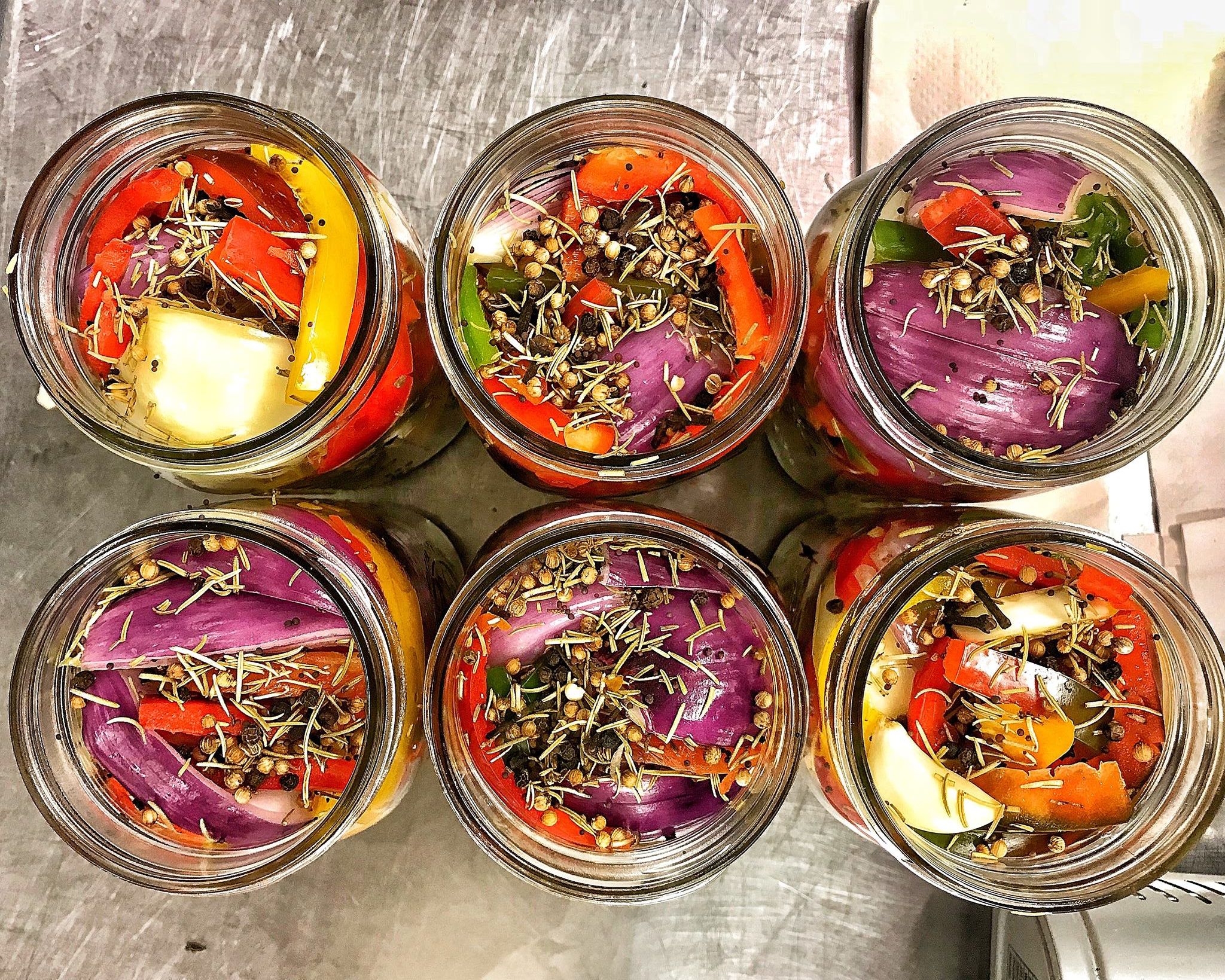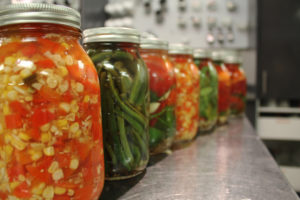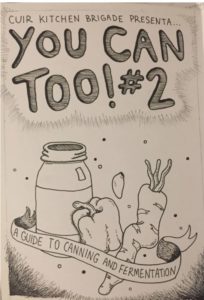By Makala Bach, Slow Food Youth Network USA

On September 20, 2017, Luz Cruz hosted a dinner party among the seed library in their New York City apartment. Cruz, a trans Puerto Rican queer in their late 20s, had gathered passionate Puerto Rican chefs, farmers, and food activists to discuss how to connect farmers on the island to the United States.
That same night, a Category 5 hurricane ravaged the island of Puerto Rico.

The Cuir Kitchen Brigade prepares to can vegetables donated by local farms. Photo by Edible Brooklyn.
Hurricane Maria was the deadliest natural disaster in the United States in the past 100 years. The severity of its destruction has been directly linked to climate change. Around 3,000 lives were lost, and the ones who survived were left without food, water, or shelter. Thousands of homes were destroyed, along with the country’s water and power supply. Supermarkets were flattened and crops were either uprooted or flooded, practically eliminating the local food supply.
The people of Puerto Rico needed a lot of things following Hurricane Maria, but they desperately needed food. A few days later, after witnessing the hunger on the island that many of them called home, Cruz and their dinner party guests felt compelled to do something.
“We weren’t just going to sit down and not do anything”
So they got to work, unofficially forming the Cuir Kitchen Brigade among empty Mason jars, intentionally using the Spanglish word for “Queer” to better represent their culture and mission. In their first effort as a Brigade, they canned fruits and vegetables donated from local farms. After eight weeks of canning, the Cuir Kitchen Brigade delivered 500 jars of food to their Puerto Rican brothers and sisters when they needed it most.
Although the brigade initially formed as a response to Hurricane Maria, they soon recognized the importance of carving out space for fellow LGBTQ+ and Black, Indigenous and People of Color (BIPOC) in a food system typically dominated by white, cisgender voices.
Following Hurricane Maria, the Cuir Kitchen Brigade looked for other ways to stand in solidarity with frontline communities affected by climate change. Their work is driven by the principles of mutual aid, and the knowledge that Black and Brown queer and transgender people know what’s best for their own communities. Wherever the Brigade saw a need, they rushed to fill it.
At one point, the Brigade drove a van of fermented food down to Tijuana to help migrants facing the notoriously poor conditions of overcrowding, lack of hygiene, and food shortages at the United States-Mexican border. In Tijuana, they partnered with Food Not Bombs, a volunteer movement that cooks plant-based meals as a way to protest war, poverty, and destruction of the environment. During their time there, the Brigade fed around 100 migrants each day using only food that would have otherwise been thrown away.
While migrants historically leave their homes to escape political instability or poverty, one-third of all migrants in 2017 moved to escape extreme weather events or food insecurity brought on by climate change.
“Queerness exists in nature”
Whether feeding people in Puerto Rico, Mexico, or New York City, Cruz feels that they are following the path planned for them by their ancestors.
Growing up with a grandfather born on a plantation in Puerto Rico, the importance of food has always been a part of Cruz’s life. When Cruz realized their queer identity, their bond with food only strengthened as they realized how much queerness intersected with nature. “Queerness exists in nature, but we’re constantly told in homogeneity that it doesn’t,” explains Cruz, “we are resistant to homogenization, just like biodiversity.”

Jars of produce ready to be transported to feed communities in need. Photo by Edible Brooklyn.
Cruz continues, providing an example from their queer ecology program at Goddard College, “There’s switching between genders that occurs in the plant kingdom, and there’s an inherent lack of gender roles in the animal kingdom. But we’re constantly told that it’s not a thing, even demeaning humans for exhibiting those same traits.”
For Cruz, the BIPOC and LGBTQ+ representation that the Cuir Kitchen Brigade stands for is especially important in a food system so intertwined with climate change because they, like the Earth, know what it’s like to be marginalized. The ongoing fight for justice and equality experienced by BIPOC and LGBTQ+ communities parallels the fight of environmental activists against climate change. Both groups know what it’s like to have to fight against a system filled with laws and policies designed specifically to slow their progress.
“Food justice and climate change are so prevalent in the media all the time now, because we’re literally experiencing the effects of a dying planet.” says Cruz. “[But] no one is talking about the queer aspect to that and how queerness plays a role in food justice, food sovereignty, and climate change.”
With 2020 officially the most active hurricane season on record and hurricanes as destructive as Maria nearly five times more likely to occur because of climate change, voices like Cruz and the Cuir Kitchen Brigade are more important than ever.

 If you want to support the Cuir Kitchen Brigade, you can donate money or buy a zine on their
If you want to support the Cuir Kitchen Brigade, you can donate money or buy a zine on their 